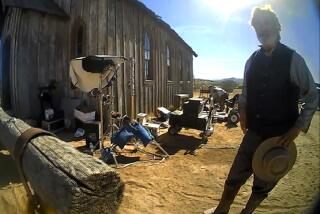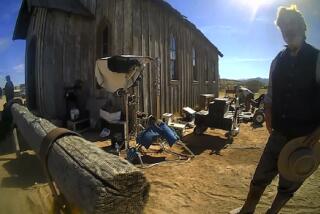SEAL Officer Not Guilty of Assaulting Iraqi
SAN DIEGO — As his family wept and his fellow Navy SEALs cheered, a SEAL lieutenant was found not guilty Friday of assaulting an Iraqi prisoner who later died at Abu Ghraib prison while being interrogated by the CIA.
The six-member jury, all officers from the Naval Special Warfare Command, deliberated for three hours before announcing that Lt. Andrew K. Ledford was not guilty of four charges stemming from a Navy investigation into the death of suspected terrorist leader Manadel Jamadi.
If he had been convicted, Ledford, 32, a Naval Academy graduate and former Marine officer, would have faced dismissal from the Navy and up to 12 years in prison.
After the verdict Ledford embraced his wife, who is six months pregnant. His mother, Angela, sobbed with relief, and his father, retired Army Col. Kenneth Ledford, had tears in his eyes.
“This was the only verdict possible,” said Ledford’s father. “I know my son. I know what kind of character he has. After 28 years in the military, I know what leadership is, and my son has it.”
Prosecutors had accused Ledford, a platoon commander, of a failure of leadership in not stopping his men from assaulting prisoners, including Jamadi. Ledford denied hitting Jamadi and said he never saw the men in his Foxtrot Platoon assaulting prisoners.
Ledford, whose promotion to lieutenant commander had been on hold because of the trial, said he was eager to return to work, including a second deployment to Iraq if ordered. “Right now, I’m going to Disney World,” he joked as he left the courtroom at the San Diego Naval Station.
Ledford shook hands with prosecutors and told them, with no hint of irony or bitterness, “You did a good job.”
“We have a system where we [SEALs] are held to a higher standard,” he told reporters. “I think that what makes this country great is that there is a system in place and it works.”
SEAL commandos -- the acronym comes from Sea, Air and Land -- are one of the military’s most elite and secretive groups.
Ledford’s defense lawyer, Frank Spinner, called on the CIA to disclose publicly what it knew about the death of Jamadi.
A team of SEALs and CIA operatives seized Jamadi at his apartment in a violent struggle; within hours he was sent to Abu Ghraib.
Prosecutor Lt. Charles Olcutt had asked jurors to convict Ledford because “he let his men down, he let his service down, he let his nation down.”
Spinner had told jurors that convicting Ledford would be a victory for terrorists. He accused the government of prosecuting Ledford because of the abuses committed at Abu Ghraib by Army personnel.
“This case represents nothing more than prosecutorial excess as a result of the pictures and abuses that occurred at Abu Ghraib,” he said.
Ledford was accused of hitting Jamadi, allowing the men in his platoon to hit Jamadi and other prisoners, lying to Navy investigators about the incidents, and acting in a manner unbecoming an officer for posing with other SEALs in a “celebratory” photograph with the hooded and handcuffed Jamadi.
In four hours of testimony Thursday, Ledford disputed the charges: denying he hit Jamadi, denying he ever saw his men hit any prisoners, and saying he did not lie to investigators, only that his memory was faulty.
Although there have been other cases of U.S. military personnel accused of assaulting Iraqi prisoners, the Ledford case was different, because it dealt with the elite, secretive SEALs and shed some light on the CIA’s role in capturing and interrogating suspected terrorists.
Nine other SEALS were charged in the case. But only Ledford went to a court-martial, at the request of the top SEAL admiral.
The other cases were dealt with in administrative hearings, where SEALs received punishment such as demotion, extra duty or a punitive letter in their personnel files.
The four days of trial included repeated closed sessions where information involving the CIA or classified SEAL tactics was discussed. When a CIA operative testified, his name was not revealed and his face was hidden by a curtain. Reporters were warned they would be arrested if they touched the curtain.
One issue, not resolved in the public sessions, was whether the CIA ordered the SEALs to ignore the Geneva Convention’s rules about humane treatment of prisoners.
In Iraq, Ledford’s platoon conducted 40 to 50 “kill or capture” missions to arrest suspected terrorists for interrogation in late 2003. Jamadi was suspected of involvement in the bombing of the Red Cross facility in Baghdad that killed 12 people.
No one has been charged in Jamadi’s death, but the CIA’s equivalent of an internal affairs unit has referred the case to the Department of Justice.
After Jamadi’s death, his body was packed in ice and whisked out of the prison. Pictures were taken of Army personnel leaning toward the body and grinning; when the pictures were published in the media, it added to the controversy about U.S. handling of Iraqi prisoners.
Ledford’s SEALs were also accused of taking unauthorized pictures of prisoners. In one, a SEAL was pointing a loaded gun at a hooded prisoner; in another, a prisoner was wearing a pumpkin mask while a Navy officer crouched over him.
Ledford was pictured smiling and holding up a can of Red Bull energy drink with a prisoner in the background.
In his final argument to jurors, prosecutor Olcutt said that the bravery of Ledford and other SEALs was not in doubt.
“Our nation should be quite grateful for this small group of quiet professionals,” he said. “But SEALs are not above the law.”
Ledford admitted in his testimony that the picture was a lapse of judgment that he regretted.
Spinner said he hoped the verdict sent a message “that we have brave warriors, valiant SEALs, who put their lives on the line and they’re human.”
More to Read
Sign up for Essential California
The most important California stories and recommendations in your inbox every morning.
You may occasionally receive promotional content from the Los Angeles Times.










